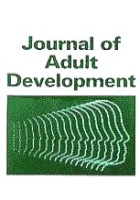Robinson et al, 2013
Les quatre phases de la crise des jeunes adultes
Mis à jour le lundi 27 mars 2017 19:09  Robinson O.C., Wright G.R.T., Smith J.A. (2013) The Holistic Phase Model of Early Adult Crisis. Journal of Adult Development, 20, 27-37. DOI: 10.1007/s10804-013-9153-y.
Robinson O.C., Wright G.R.T., Smith J.A. (2013) The Holistic Phase Model of Early Adult Crisis. Journal of Adult Development, 20, 27-37. DOI: 10.1007/s10804-013-9153-y.
AbstractThe objective of the current study was to explore the structural, temporal and experiential manifestations of crisis episodes in early adulthood, using a holistic-systemic theoretical framework. Based on an analysis of 50 interviews with individuals about a crisis episode between the ages of 25 and 35, a holistic model was developed. The model comprises four phases: (1) Locked-in, (2) Separation/Time-out, (3) Exploration and (4) Rebuilding, which in turn have characteristic features at four levels—person-in-environment, identity, motivation and affect-cognition. A crisis starts out with a commitment at work or home that has been made but is no longer desired, and this is followed by an emotionally volatile period of change as that commitment is terminated. The positive trajectory of crisis involves movement through an exploratory period towards active rebuilding of a new commitment, but ‘fast-forward’ and ‘relapse’ loops can interrupt Phases 3 and 4 and make a positive resolution of the episode less likely. The model shows conceptual links with life stage theories of emerging adulthood and early adulthood, and it extends current understandings of the transitional developmental challenges that young adults encounter. Consulter/Télécharger |
- Article précédentPoirier, 2003b
- Article suivantRugg et al, 1998
 Robinson O.C., Wright G.R.T., Smith J.A. (2013) The Holistic Phase Model of Early Adult Crisis. Journal of Adult Development, 20, 27-37. DOI: 10.1007/s10804-013-9153-y.
Robinson O.C., Wright G.R.T., Smith J.A. (2013) The Holistic Phase Model of Early Adult Crisis. Journal of Adult Development, 20, 27-37. DOI: 10.1007/s10804-013-9153-y.
